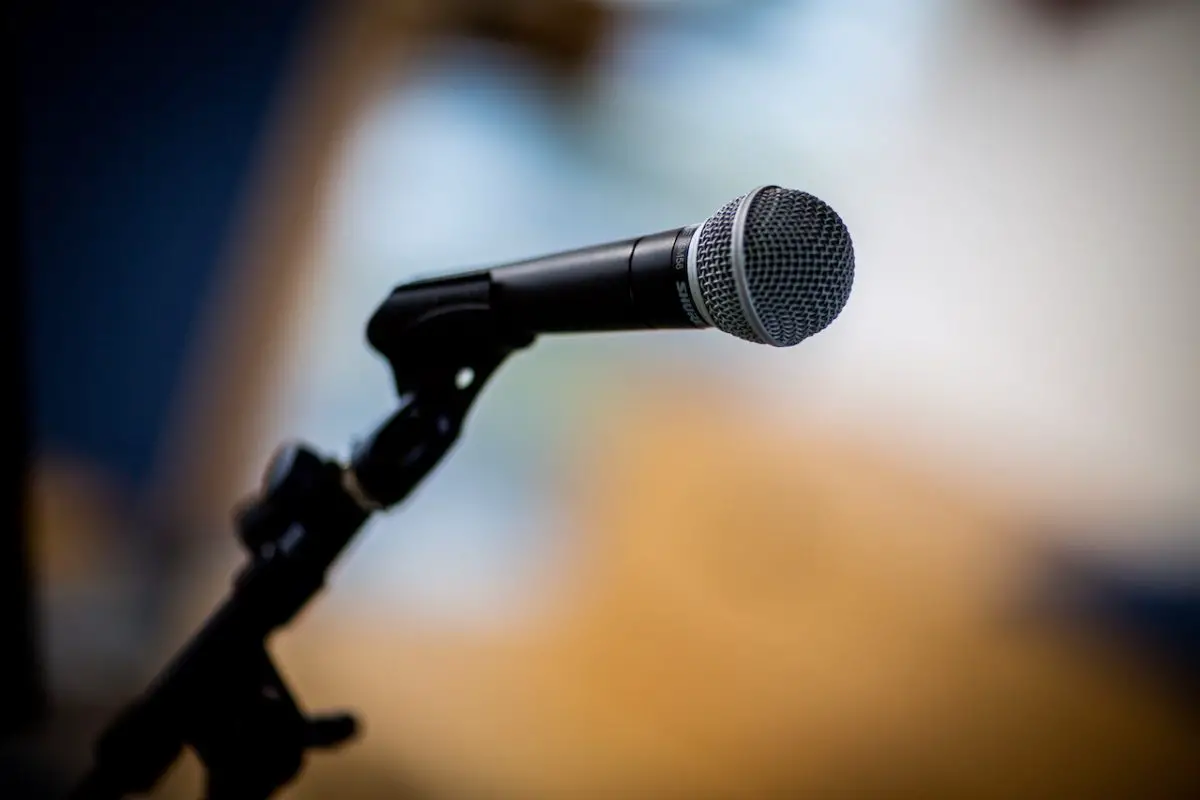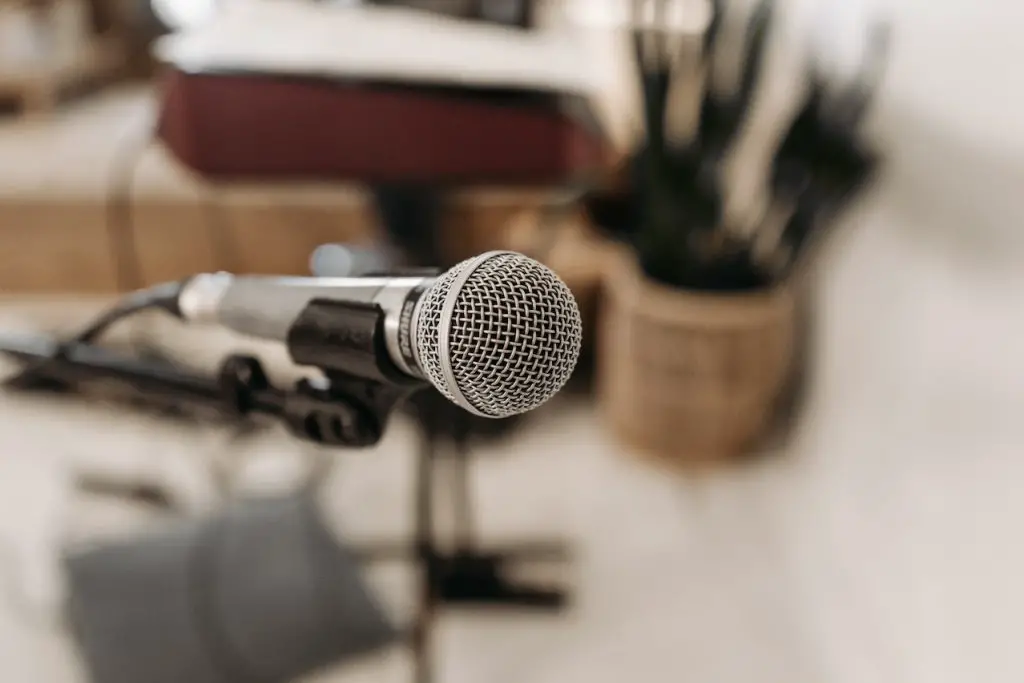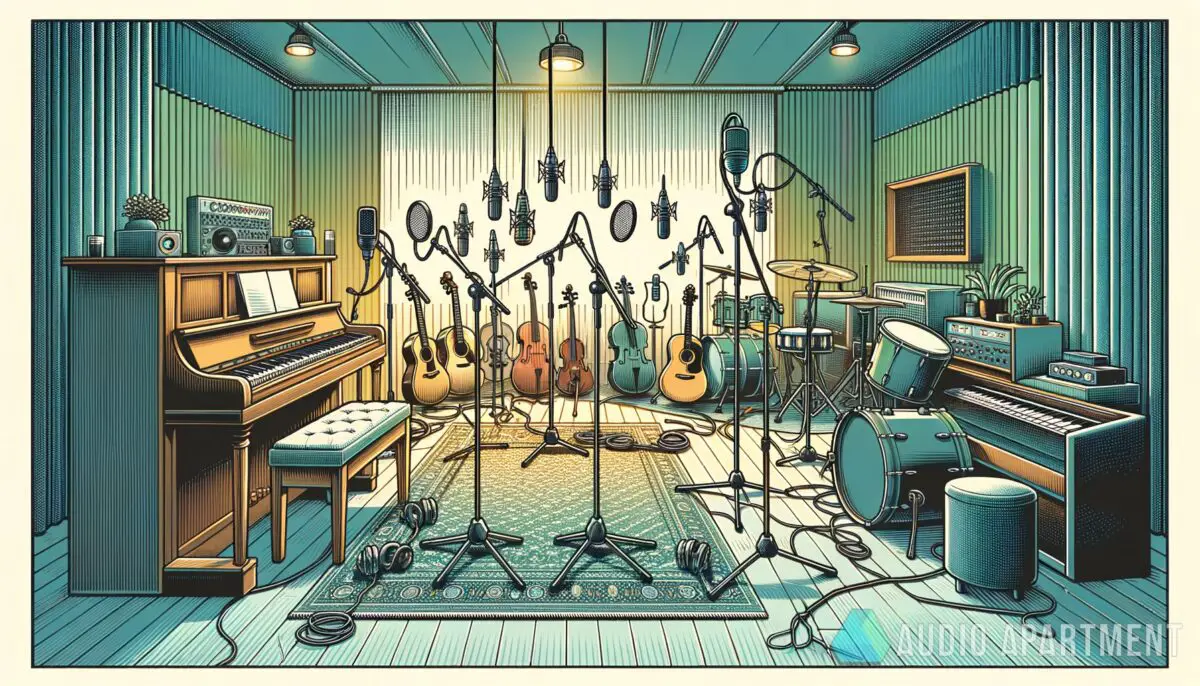If you’re a musician or producer looking for the perfect microphone, consider the Shure SM58. The SM58 has been a staple in professional recording studios for decades and is renowned for its sound quality and durability. But can it be used for recording vocals?
This article covers whether or not the Shure SM58 is suitable for recording vocals. We’ll look at what makes the SM58 an ideal choice so that you can make an informed decision before investing in this microphone. So if you’re a beginner, an experienced producer, or just curious about the Shure SM58, this post is for you!
Can you use a Shure SM58 microphone for recording vocals? Yes. The quality of voice recordings may be improved by using a Shure SM58 microphone. However, its limitations in the studio mean it is often reserved for live singing. There are many different kinds of microphones in a modern recording studio, and each one is made for a different job.
What is the Shure SM58 microphone?
The Shure SM58 is a legendary microphone. The history of Shure microphones begins in 1965 with the creation of the first model by Shure Incorporated. Its high sound quality and lengthy lifespan have won over many musicians. The Shure SM58, along with its sibling, the Shure SM57, has consistently ranked as one of the best-selling studio microphones (SMs) in the industry’s history.

The Shure SM58 is a directional microphone, meaning it can only record audio from a single direction. Too near of a vocal approach will result in an amplification of the bass frequencies. Live performers like it because of its cardioid response, reducing pickup from the sides and rear to reduce feedback. A shock mount was included in the microphones to reduce any noise the user may have caused.
For those who are performing vocals live, this microphone is a must. If you don’t use the switch, the microphone will enhance the naturalness and depth of your voice.
You may do so easily using the Shure since it is compact and lightweight. Soft rubber is used to suspend the mic capsule. In contrast to a solid rubber casing, the pneumatic suspension improves feedback and handling noise damping.
For those who are performing vocals live, this microphone is a must. If you don’t use the switch, the microphone will enhance the naturalness and depth of your voice. Because of how it is shaped, it can also focus on one source of sound while ignoring others. You may use the mic to record vocals, but there are a few limitations you’ll need to be aware of.
AKAI Professional MPK Mini MK3

AKAI Professional MPK Mini MK3
Can you use the Shure SM58 for recording vocals?
For the same reason that the SM58’s frequency response makes it a great vocal microphone for live performances, it may also be a great microphone for recording voices in your home studio, requiring less processing in the mix to get the same effect.
Most voices will be “rolled off” (given a low shelf) below 100 Hz as part of mixing audio. As a rule, condenser microphones are used to capture voices. However, the frequency response of the SM 58 demonstrates that it falls off naturally below 100 Hz. Therefore, this EQ is no longer necessary.
Second, the frequency response shows that the voices are strongest between 2000 and 5000 Hz, which is a range that naturally gets louder. Therefore, EQing the vocals is unnecessary. Naturally, SM58 is included.
Advantages and disadvantages of using the Shure SM58 for recording vocals
When it comes to recording vocals, one of the most popular microphones in the industry is the Shure SM58. This dynamic microphone has been around for decades and has been used by countless musicians, podcasters, and voice actors. Here are the advantages and disadvantages of using the Shure SM58 for recording vocals.
Advantages
The Shure SM58 offers several advantages when it comes to recording vocals, including:
- Durability: The SM58 is built to last, with a rugged design that can withstand rough handling and tough environments.
- Versatility: This microphone can handle a variety of vocal styles, from soft and subtle to loud and aggressive.
- Warm and Natural Sound: The SM58 is known for its warm and natural sound, which is especially suited for vocals.
- Directionality: This microphone is designed to pick up sound from the front, which can help to minimize unwanted background noise.
- Cost-effective: The SM58 is an affordable option for those on a budget without sacrificing quality.
Disadvantages
While the Shure SM58 has many advantages, there are some potential drawbacks to consider, including:
- Lack of Clarity: The SM58 may not offer the same level of clarity as some higher-end microphones, which can be a disadvantage for those seeking a very detailed and crisp sound.
- Sensitivity: The SM58 has a lower sensitivity than some other microphones, which can result in a quieter signal and require more gain to achieve the desired volume.
- Pop and Sibilance: Without proper technique or a pop filter, the SM58 can be prone to picking up pops and sibilance (hissing or exaggerated “s” sounds) from the vocalist.
The Shure SM58 is a popular and reliable choice for recording vocals, offering durability, versatility, warm sound, directionality, and affordability. However, its potential drawbacks include lack of clarity, sensitivity, and susceptibility to pops and sibilance. As with any microphone, it’s important to consider your specific needs and preferences before making a decision.
Tips for getting the best sound from your Shure SM58 microphone
The Shure SM58 microphone is a popular choice for professional vocal use in sound reinforcement and studio recording. Here are some tips for getting the best sound from your Shure SM58 microphone:
1. Position the microphone correctly
The SM58 is a unidirectional (cardioid) microphone, which means it picks up sound from one direction while rejecting sound from other directions. Position the microphone so that the front of the microphone (the side with the Shure logo) is pointed at the sound source, usually the singer’s mouth. The microphone should be held about 2-3 inches away from the singer’s mouth.
2. Use a pop filter
The SM58 has a built-in spherical filter that minimizes wind and breath “pop” noise, but you can further reduce these noises by using an external pop filter. A pop filter is a thin screen that is placed in front of the microphone to diffuse the force of plosives (consonants like “p,” “t,” and “b”) that can cause unwanted popping sounds.
3. Use the proper microphone technique
Encourage the singer to sing directly into the microphone and to avoid turning their head or moving around too much while singing. This will help ensure consistent sound quality and minimize unwanted noise.
4. Adjust the microphone level
The SM58 is a dynamic microphone, which means it does not require phantom power and has a relatively low output level compared to condenser microphones. Adjust the gain level on your preamp or mixer to ensure that the signal from the microphone is strong enough without clipping or distorting.
5. Experiment with placement and EQ
Every performance space and sound source is different, so don’t be afraid to experiment with microphone placement and EQ settings to find the best sound for your particular situation. You can also try using different mic positions or techniques for different parts of a song to create variation and interest.
By following these tips, you can help ensure that you get the best possible sound from your Shure SM58 microphone.

How does the Shure SM58 compare with other microphones?
This table compares the Shure SM58 with other popular microphones used for recording vocals. The data includes the frequency response range, sensitivity, and maximum SPL (sound pressure level) for each microphone, as well as the average price range.
| Microphone Model | Frequency Response Range | Sensitivity (dBV/Pa) | Max SPL (dB) | Average Price Range |
|---|---|---|---|---|
| Shure SM58 | 50 Hz – 15 kHz | -54.5 | 149 | $89 – $99 |
| Audio-Technica AT4053b | 20 Hz – 20 kHz | -35.0 | 145 | $599 – $699 |
| Neumann U87 | 20 Hz – 20 kHz | -34.0 | 127 | $3,500 – $4,000 |
| AKG C414 XLII | 20 Hz – 20 kHz | -23.0 | 158 | $1,099 – $1,299 |
As shown in the table, the Shure SM58 has a narrower frequency response range compared to other microphones, but it has a high maximum SPL and a lower price point. It is a dynamic microphone that is known for its durability and is commonly used for live performances.
While it may not have the same level of detail and sensitivity as some of the more expensive microphones, it can still be a great option for recording vocals in a home studio or for demos.
If you want even more tips and insights, watch this video called “Getting the Most From Your Shure SM58 Microphone” from the Sweetwater YouTube channel.
Frequently asked questions (FAQ)
Do you still have questions about whether you can use the Shure SM58 microphone for recording vocals? Below are some of the most commonly asked questions.
Is a Shure SM58 good for studio vocals?
If you plan on doing a lot of voice recording, the Shure SM58 is a fantastic microphone to have on hand. In addition, the Shure SM58 is well-known as a microphone used for live singing performances.
Why is the Shure SM58 good for recording vocals?
The SM58’s popularity among artists and public speakers may be attributed to its adaptability, durability, built-in pop filter, a cardioid polar pattern that rejects ambient noise, clear sound, and balanced frequency response.
Is SM57 or SM58 better for vocals?
The SM58 excels at picking up vocals, whereas the SM57 is more versatile. How, when, and where you utilize them depends on your preferences. But rest assured that any choice will provide you with a high-quality microphone.
Conclusion
The Shure SM58 is a great choice for recording vocals, and many sound engineers use it all the time. The microphone’s durable design, affordability, and impressive sound quality make it a great option for those looking to record vocals in the studio or on the go. It also has a built-in pop filter, so you don’t have to worry about purchasing one separately. So whether you’re a beginner or a professional, the Shure SM58 is a great choice for recording vocals.
So, are you willing to try a Shure SM58 for recording vocals? And did I cover everything you wanted to know? Let me know in the comments section below (I read and reply to every comment). If you found this article helpful, share it with a friend, and check out my full blog for more tips and tricks on music production. Thanks for reading, and never stop making music.
Key takeaways
This article covered whether you can use the Shure SM58 microphone for recording vocals. Here are some key takeaways:
- The Shure SM58 is a legendary microphone.
- For the same reason that the SM58’s frequency response proves it to be an ideal vocal microphone for live performance, it may also be an excellent microphone for recording voices in your home studio, requiring less processing in the mix to get the same effect.
- The Shure SM58 is known to handle various vocal styles and is a cost-effective option.
- The SM58 has lower sensitivity compared to other microphones. It may require more gain to achieve the desired volume.
- To get the most out of your SM58, make sure to position it correctly, use a pop filter, use the proper microphone technique, adjust the microphone level, and experiment with placement and EQ.















